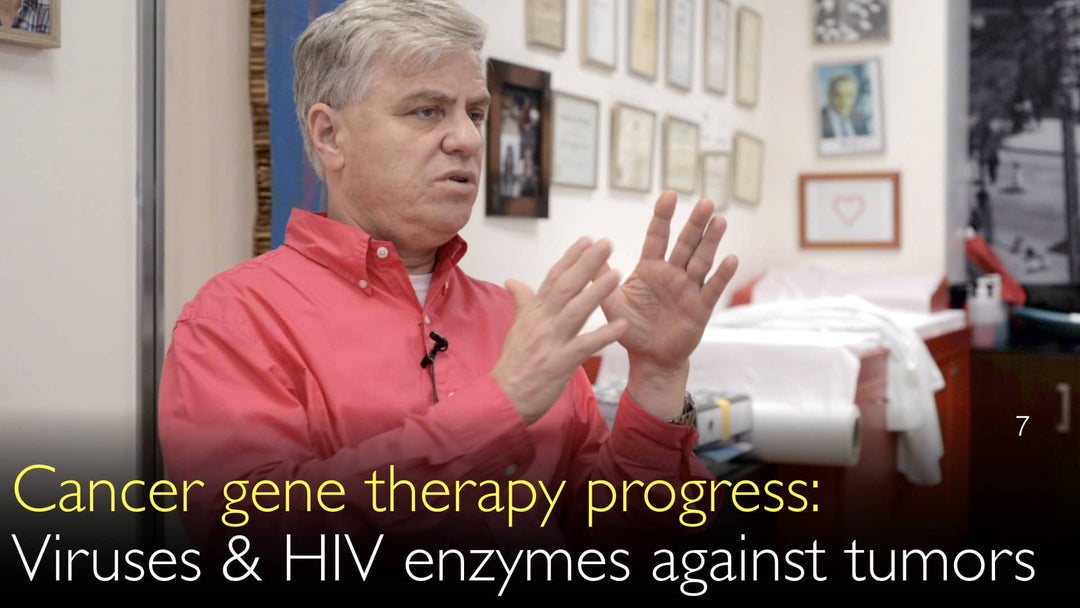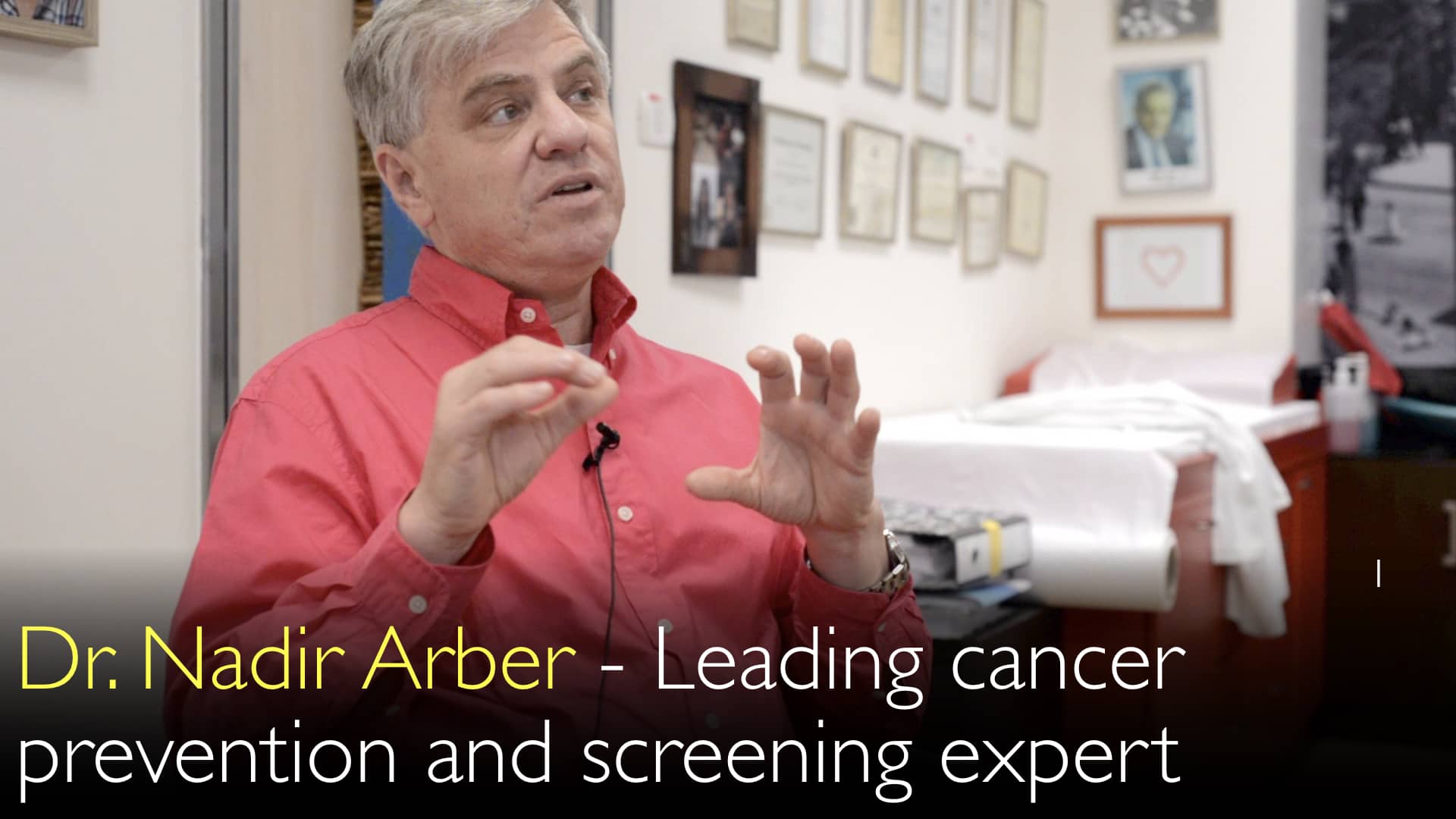Johtava syöpäasiantuntija, lääketieteen tohtori Nadir Arber käsittelee paksu- ja peräsuolisyövän innovatiivisia geenihoitomenetelmiä, jotka hyödyntävät virusvektoreita ja HI-viruksen entsyymejä kasvainten kohdentamiseen. Tätä kokeellista lähestymistapaa, jota kutsutaan "Troijan hevosen strategiaksi", pyritään käyttämään syöpäsolujen valikoivaan tuhoamiseen terveitä soluja säästäen. Lääketieteen tohtori Nadir Arber selittää, kuinka tätä täsmälääketieteen alustaa voidaan soveltaa useisiin syöpätyyppeihin, tarjoten uusia toivonkipinöitä parantumattomasti sairaille potilaille. Hoitomenetelmä perustuu aktiivisten syöpäsolujen tunnistamiseen, tappavien geenejen toimittamiseen virusten avulla sekä kasvainten geenien hyödyntämiseen terveiden solujen suojelemiseksi. Lääketieteen tohtori Anton Titov korostaa tämän mullistavan tutkimuksen potentiaalia muuttaa syövän hoitoa.
Innovatiivinen geeniterapia paksusuolen syöpään: virukset vektorina ja täsmälääketiede
Hyppää kohtaan
- Geeniterapia paksusuolen syöpään
- Troijan hevonen -strategia syöpähoidossa
- Virusvektorit ja tappavat geenit
- Täsmälääketieteen alusta syövälle
- HIV-entsyymit syöpähoidossa
- Syövän geeniterapian tulevaisuus
- Koko tekstitys
Geeniterapia paksusuolen syöpään
Lääketieteen tohtori Nadir Arber on uranuurtaja paksusuolen syövän geeniterapiassa virusvektoreita hyödyntäen. Tämä kokeellinen hoito on suunnattu parantumattomille potilaille, ja se tarjoaa viimeisen vaihtoehdon, kun muut hoidot eivät ole tehonneet. Menetelmässä terapeuttiset geenit toimitetaan suoraan syöpäsoluihin, mikä mahdollistaa kohdennetun ja mahdollisesti tehokkaamman hoidon.
Troijan hevonen -strategia syöpähoidossa
Tohtori Arber kuvailee ”Troijan hevonen -strategian” uudenlaisena lähestymistapana syövän torjunnassa. Tekniikka hyödyntää syövän omaa kasvureittiä tappavien geenien toimittamiseksi pahanlaatuisiin soluihin. Strategia kohdentuu syöpäsoluille ominaisiin reitteihin, ja sen tavoitteena on pysäyttää kasvaimen kasvu minimoiden samalla terveiden kudosten vaurioituminen.
Virusvektorit ja tappavat geenit
Virusvektoreita käytetään tappavien geenien kohdentamiseen syöpäsoluihin. Lääketieteen tohtori Nadir Arberin mukaan vektorit on suunniteltu tuottamaan vasta-aineita, jotka tunnistavat syöpäkohtaisia merkkiaineita kuten CD24:ää. Tämä varmistaa, että terapeuttiset geenit aktivoituvat ainoastaan syöpäsoluissa, säästäen terveet solut vahingoilta.
Täsmälääketieteen alusta syövälle
Tämä geeniterapian lähestymistapa muodostaa täsmälääketieteen alustan, jota voidaan räätälöidä potilaskohtaisesti ja kasvaintyypeittäin. Lääketieteen tohtori Anton Titov korostaa strategian joustavuutta: se mahdollistaa hoidon mukauttamisen syövän geneettisen profiilin perusteella, mikä voi parantaa hoidon tuloksia.
HIV-entsyymit syöpähoidossa
Tohtori Arber tutkii myös HIV-entsyymien, erityisesti integraasin, hyödyntämistä syöpähoidossa. Innovatiivisessa lähestymistavassa entsyymiä käytetään aiheuttamaan DNA-rikkomia syöpäsoluissa, mikä laukaisee immuunivasteen ja johtaa solukuolemaan. Menetelmä hyödyntää kehon luontaisia puolustusmekanismeja syöpäsolujen valikoivaan tuhoamiseen.
Syövän geeniterapian tulevaisuus
Geeniterapialla on merkittävä potentiaali mullistaa syöpähoito. Lääketieteen tohtorit Nadir Arber ja Anton Titov keskustelevat kehittyneiden hoitomenetelmien lupaavuuksista muuttaa onkologian kenttää. Täsmälääketiedettä hyödyntäen geeniterapia tarjoaa uutta toivoa potilaille, joilla on vaikea ennuste.
Koko tekstitys
Lääketieteen tohtori Anton Titov: Geeniterapia taikaluotina syöpää vastaan herättää mielikuvitusta, mutta edistys on ollut hidasta. Johtava syöpäasiantuntija ja tutkija jakaa uusia ideoita virusten hyödyntämisestä kasvainten hoidossa.
Lääketieteen tohtori Anton Titov: Työskentelet myös geeniterapian parissa paksusuolen syövän hoidossa virusvektoreita käyttäen. Voisitko keskustella työstäsi tällä alueella?
Lääketieteen tohtori Nadir Arber: Kyllä, on tärkeää korostaa, että tämä on edelleen kokeellista. Tällä viikolla aiomme aloittaa geeniterapian ensimmäisille paksusuolen syöpäpotilaille. Hoidamme parantumattomia potilaita, ja se on kuin armohoito. Toimimme viimeisenä vaihtoehtona, sillä osa potilaista kuolisi muuten.
Lääketieteen tohtori Anton Titov: Potilaalla ei ole mitään menetettävää, joten toivoa on. Odotukset paksusuolen syövän geeniterapialle ovat kuitenkin varovaisia. Tämä on jälleen kerran yritys ajatella laatikon ulkopuolelta.
Lääketieteen tohtori Nadir Arber: Toisinaan normaaleista soluista tulee pahanlaatuisia, ja niissä on yleensä joitain mutaatioita, kuten KRAS. Syöpäsolut jakautuvat hallitsemattomasti ja muuttuvat syöväksi. Kemoterapialla tai muulla hoidolla pyrimme pysäyttämään nämä aktiiviset molekyylireitit, jotka muuttavat solut pahanlaatuisiksi. Usein hoito pysäyttää kasvaimen kasvun, kun syövän kasvureitti suljetaan. Ajan myötä syöpä voi kuitenkin löytää uusia kasvureittejä, ja tauti etenee uudelleen. Tämä on kliinisesti tyypillinen tilanne: kasvun uusiutuminen johtaa nopeaan heikkenemiseen ja usein potilaan kuolemaan.Laboratoriossani kokeilemme toisenlaista lähestymistapaa. Kutsin sitä Troijan hevonen -strategiaksi. Sen sijaan, että estäisimme syövän kasvureittejä, hyödynnämme niitä tappaaksemme syöpäsoluja. Strategia koostuu viidestä osasta: ensin tunnistamme aktiiviset syövän molekyylireitit. Seuraavaksi selvitämme, mihin kohtaan tumassa reitti kiinnittyy – DNA:han liittyvään elementtiin. Syövän kasvusignaali kulkee kalvolta solulimaan ja sitten tumaan, käskien soluja jakautumaan. Voimme kytkeä tappavan geenin tähän signaaliin, jolloin se aktivoituu vain syöpäsoluissa. Strategian tehostamiseksi käytämme yleensä viruksia toimittamaan tappavan geenin rakenteen syöpäsoluihin.
Haluamme kohdistaa geeniterapian valikoivasti syöpäsoluihin. Ilmennämme viruspinnoille spesifisiä vasta-aineita, jotka tunnistavat CD24:än – pahanlaatuisissa soluissa esiintyvän merkkiaineen. Lopuksi ilmennämme hyvin tehokkaita tappavia geenejä, jotka perustuvat syövän kasvureitteihin. Käytämme myös vastamyrkkyjä, joita säätelevät kasvaimen supressorigeenit; ne ilmenevät normaaleissa soluissa, eivät pahanlaatuisissa. Näin voimme tappaa syöpäsoluja valikoivasti ja samalla suojella terveitä soluja. Biologisissa järjestelmissä on aina jonkin verran ”vuotoa”, joten voimme ilmentää vastamyrkkyjä normaaleissa soluissa ja käyttää jopa suurempia geeniannoksia turvallisesti.
Lääketieteen tohtori Nadir Arber: Tämä on erittäin lupaava lähestymistapa paksusuolen syövän hoidossa. Sen vahvuutena on, että se toimii alustana useille syöpätyypeille eikä rajoudu yhteen syöpään. Strategian osia voidaan mukauttaa potilaan tai kasvaimen tarpeiden mukaan – täsmälääketiedettä parhaimmillaan. Katsomme tulevaisuuteen uskoen, että tämä voi muuttaa syöpähoidon maisemaa, mikä on jokaisen kliinikon ja tutkijan tavoite. Ehdottomasti!Toinen käynnissä oleva kliininen tutkimus hyödyntää uutta lääkettä, jota käytetään HIV-potilaiden hoidossa. Se perustuu HIV-viruksen integraasientsyymiin. Aloitamme nyt syöpähoidon kliinisen tutkimuksen tällä tekniikalla, ja se näyttää erittäin lupaavalta.
Lääketieteen tohtori Nadir Arber: Käytämme laboratoriossamme kehitettyjä viruksia kohdentamaan syöpäsoluja. Virukset tuovat integraasientsyymin, joka aiheuttaa DNA-leikkauksia. Kun DNA:ssa on useita leikkauksia, immuunijärjestelmä tunnistaa solut syöpäsoluiksi ja käynnistää solukuolemaohjelman, apoptoosin, joka tuhoaa syöpäsolut valikoivasti. Tämä on kiehtova uusi hoitomuoto, ”laatikon ulkopuolelta ajattelua”. Geeniterapia tarjoaa toivoa syöpähoidolle ja hyödyntää aitoa täsmälääketiedettä. Kyllä, juuri niin!




